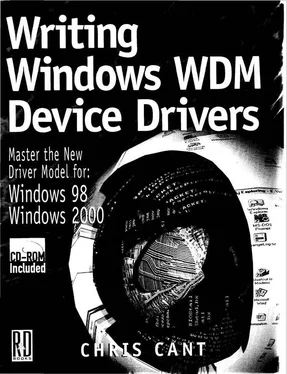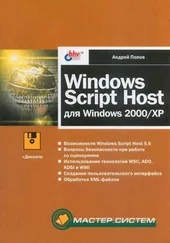Chris Cant - Writing Windows WDM Device Drivers
Здесь есть возможность читать онлайн «Chris Cant - Writing Windows WDM Device Drivers» весь текст электронной книги совершенно бесплатно (целиком полную версию без сокращений). В некоторых случаях можно слушать аудио, скачать через торрент в формате fb2 и присутствует краткое содержание. Город: Lawrence, Kansas 66046, ISBN: , Издательство: R & D Books, Жанр: Программирование, на английском языке. Описание произведения, (предисловие) а так же отзывы посетителей доступны на портале библиотеки ЛибКат.
- Название:Writing Windows WDM Device Drivers
- Автор:
- Издательство:R & D Books
- Жанр:
- Год:неизвестен
- Город:Lawrence, Kansas 66046
- ISBN:0-87930-565-7
- Рейтинг книги:5 / 5. Голосов: 1
-
Избранное:Добавить в избранное
- Отзывы:
-
Ваша оценка:
- 100
- 1
- 2
- 3
- 4
- 5
Writing Windows WDM Device Drivers: краткое содержание, описание и аннотация
Предлагаем к чтению аннотацию, описание, краткое содержание или предисловие (зависит от того, что написал сам автор книги «Writing Windows WDM Device Drivers»). Если вы не нашли необходимую информацию о книге — напишите в комментариях, мы постараемся отыскать её.
Writing Windows WDM Device Drivers — читать онлайн бесплатно полную книгу (весь текст) целиком
Ниже представлен текст книги, разбитый по страницам. Система сохранения места последней прочитанной страницы, позволяет с удобством читать онлайн бесплатно книгу «Writing Windows WDM Device Drivers», без необходимости каждый раз заново искать на чём Вы остановились. Поставьте закладку, и сможете в любой момент перейти на страницу, на которой закончили чтение.
Интервал:
Закладка:
Listing 23.10 HidKbd GetPreparsedData routine
bool GetPreparsedData(IN PDEVICE_OBJECT HidDevice, OUT PHIDP_PREPARSED_DATA HidPreparsedData) {
HID_COLLECTION_INFORMATION HidCi;
NTSTATUS status = CallHidIoctl(HidDevice, IOCTL_HID_GET_COLLECTION_INFORMATION, &HidCi, sizeof(HidCi));
if (!NT_SUCCESS(status)) {
DebugPrint("IOCTL_HID_GET_COLLECTION_INFORMATION failed %x", status);
return false;
}
DebugPrint("HID attributes: VendorID=%4x, ProductID=%4x, VersionNumber=%4x",
HidCi.VendorID, HidCi.ProductIO, HidCi.VersionNumber);
ULONG PreparsedDatalen = HidCi.DescriptorSize;
DebugPrint("PreparsedDatalen %d", PreparsedDatalen);
HidPreparsedData = (PHIDP_PREPARSED_DATA)ExAllocatePool(NonPagedPool, PreparsedDatalen);
if (HidPreparsedData==NULL) {
DebugPrintMsg("No memory");
return false;
}
status = CallHidIoctl(HidDevice, IOCTL_HID_GET_COLLECTON_DESCRIPTOR, HidPreparsedData, PreparsedDatalen);
if (!NT_SUCCESS(status)) {
DebugPrint("IOCTL_HID_GET_COLLECTION_DESCRIPTOR failed %x", status);
return false;
}
return true;
}
The DDK documentation for the HID class driver read and write handler says that the IRP file object pointer must be valid. HidKbd obtained a file object using IoGetDeviceObjectPointer when it first found a HID device. However, this file handle was closed because it stops the HID device from being removed.
When a user mode application opens a handle to a HidKbd device, the Create IRP handler receives another file object pointer. This same file object pointer is passed in subsequent Read, Write, and Close IRPs, etc.
The HidKbd Create IRP handler, HidKbdCreate , therefore, has to tell the HID class driver about this new file object pointer. It does this by passing the Create IRP to the HID class driver. This is actually very easy to do by putting this extra code in the HidKbdCreate routine.
As HidKbd does not need to process the IRP afterwards, there is no need to set a completion routine.
// Forward IRP to HID class driver device
IoSkipCurrentIrpStackLocation(Irp);
return IoCallDriver(dx->HidDevice, Irp);
The HidKbd Close IRP handler, HidKbdClose , has exactly the same lines in it. This tells the HID class driver that the file handle is being closed.
A side effect of making the HID class driver open a handle for the device is that Windows 2000 will not let the HID device be removed for the duration. This is a perfectly acceptable behavior.
Reading and Writing Data
Our HID kernel mode client is now finally ready to read and write data.
HidKbd currently only supports reading of input reports. The Read IRP expects the provided buffer to be big enough. For a keyboard-input report, the buffer must be at least nine bytes long. The first byte will be 0, with the eight bytes of the input report in the remaining bytes. HidKbd makes no attempt to analyze the data in the same way as HidKbdUser. Instead, it simply returns all the information to the user mode application.
The main Read IRP handler, HidKbdRead, eventually calls ReadHidKbdInputReport , shown in Listing 23.11. ReadHidKbdInputReport is passed the precious file object pointer and a pointer to the buffer. It returns a count of the number of bytes transferred.
ReadHidKbdInputReport looks similar to the CallUSBDI and CallHidIoctl routines described before. This time HidKbd must issue a read request to the HID class driver, so it uses IoBuildSynchronousFsdRequest kernel call to build a suitable Read IRP. An event can be used to wait synchronously for the IRP to be completed, so ReadHidKbdInputReport must be called at PASSIVE_LEVEL IRQL.
By default, IoBuildSynchronousFsdRequest does not insert a file object pointer into the IRP. Therefore, HidKbd must do this job by hand. It calls IoGetNextIrpStackLocation to get the stack location that will be seen by the next driver, the HID class driver. ReadHidKbdInputReport then simply stores the PFILE_OBJECT in the stack FileObject field.
Finally, HidKbd runs IoCallDriver to call the HID class driver. If the IRP is still pending when this call returns, ReadHidKbdInputReport waits for the event to become signalled when the IRP does complete.
I have left out one small part of the story. The DDK says that HID class drivers use Direct I/O for their input and output buffers, not Buffered I/O. Luckily, IoBuildSynchronousFsdRequest sorts this out for us. It checks if the called driver uses Direct I/O. If it does,it allocates the required MDL for the passed input or output buffer (and deallocates it on completion).
Listing 23.11 ReadHidKbdlnputReport routine
NTSTATUS ReadHidKbdInputReport(PFILE_OBJECT FileObject, PVOID Buffer, ULONG& BytesTxd) {
PHIDKBD_DEVICE_EXTENSION dx = (PHIDKBD_DEVICE_EXTENSION)HidKbdDo->DeviceExtension;
BytesTxd = 0;
if (HidKbdDo==NULL) return STATUS_NO_MEDIA_IN_DEVICE;
IO_STATUS_BLOCK IoStatus;
IoStatus.Information = 0;
KEVENT event;
LARGE_INTEGER FilePointer;
FilePointer.QuadPart = 0i64;
// Initialise IRP completion event
KeInitializeEvent(&event, NotificationEvent, FALSE);
PIRP Irp = IoBuildSynchronousFsdRequest(IRP_MJ_READ, dx->HidDevice,
Buffer, dx->HidInputReportLen, &FilePointer, &event, &IoStatus);
if (Irp==NULL) return STATUS_INSUFFICIENT_RESOURCES;
// Store file object pointer
PIO_STACK_LOCATI0N IrpStack = IoGetNextIrpStackLocation(Irp);
IrpStack->FileObject = FileObject;
// Call the driver and wait for completion if necessary
NTSTATUS status = IoCallDriver(dx->HidDevice, Irp);
if (status == STATUS_PENDING) {
KeWaitForSingleObject(&event, Suspended, KernelMode, FALSE, NULL);
status = IoStatus.Status;
}
// return IRP completion status
DebugPrint("ReadHidKbdInputReport: status %x", status);
BytesTxd = IoStatus.Information;
return status;
}
Permanently Allocated IRP
A kernel mode HID client is likely to be reading many input reports. Rather than building up a suitable IRP for each call, it is more efficient to have one at the ready all the time. However, this approach is a bit more complicated to set up. The HidKbd driver has this alternative code commented out.
When a HidKbd device is created, it must allocate the IRP that will be reused in all subsequent read and write requests. The SetupHidIrp routine, shown in Listing 23.12, calls IoAllocateIrp to obtain a suitable IRP pointer from the I/O Manager. As IRPs have a variable number of stack locations, SetupHidIrp must pass the desired stack size. The second parameter to IoAllocateIrp should be FALSE for intermediate drivers.
It also makes sense to preallocate a buffer for input and output reports. SetupHidIrp works out the size of buffer needed and allocates it from the nonpaged pool. The final preparatory step is to allocate an MDL for this buffer. Remember that the HID class driver uses Direct I/O and so needs an MDL passed in Read and Write IRPs. The call to IoAllocateMdl makes a suitable MDL out of the buffer pointer.
Читать дальшеИнтервал:
Закладка:
Похожие книги на «Writing Windows WDM Device Drivers»
Представляем Вашему вниманию похожие книги на «Writing Windows WDM Device Drivers» списком для выбора. Мы отобрали схожую по названию и смыслу литературу в надежде предоставить читателям больше вариантов отыскать новые, интересные, ещё непрочитанные произведения.
Обсуждение, отзывы о книге «Writing Windows WDM Device Drivers» и просто собственные мнения читателей. Оставьте ваши комментарии, напишите, что Вы думаете о произведении, его смысле или главных героях. Укажите что конкретно понравилось, а что нет, и почему Вы так считаете.






